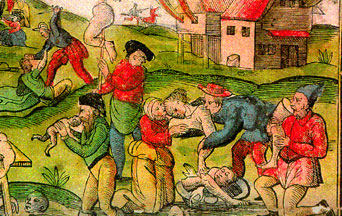
Dostoevsky once said, “If God didn’t exist, everything is possible.” There is wisdom in his observation since, without God, there would be nothing to serve as the ultimate reference for human acts. The eternal law that God established in the universe is inscribed on the human heart. Thus, everyone at all times and places knows right and wrong. Take away God, and all will fall into the most barbaric savagery.
Modern secular society officially denies that God exists. Thus, society comes to accept the cruelest practices by breaking down the natural repugnance that comes from transgressing God’s law. Abortion and infanticide, for example, used to incite horror among civilized people. Now, it is accepted everywhere. Some taboos remain, but these are now being questioned. Indeed, few could imagine that a mainstream news magazine like Newsweek would propose rethinking the idea of cannibalism.
Eating Flesh: The Ultimate Taboo
Eating human flesh is the subject of a feature article. Psychologists Jared Piazza and Neil McLatchie of England’s Lancaster University declare there is nothing unethical or unreasonable about the practice. The problem with cannibalism is people’s attitudes since they are often “overridden by our feelings of repulsion and disgust.”
The reasoning behind the outlandish conclusion reveals the atheistic premises of the authors and the scientific establishment. The main title of the article says it all: “Cannibalism is common in the animal kingdom.” Thus, there is no logical reason why it should not be allowed for humans. Living creatures from spadefoot tadpoles, praying mantises, chimpanzees to lions cannibalize their own. The human is just another animal like all others.
Eternal and Natural Law: The Foundation of Morals and Law
The problem is humans have always had a horror for cannibalism that transcends biological reasons. Because they cannot think in spiritual terms, the two scholars resort to “scientific” theories that turn the aversion into a psychological problem. Humans are generally not cannibals, they claim, because “[o]ur capacity to represent the personalities of the living and the departed is unparalleled. This deep connection between personhood and flesh can mean that careful reasoning in certain situations over the merits of cannibalism is overridden by our feelings of repulsion and disgust.”
The Presence of the Soul
In other words, people perceive the presence of a soul in the body that represents the spiritual qualities of personality, rationality and immortality. They sense it is wrong to violate the body that houses this noble part of the human being. People see no “merit” in cannibalism; they see sacrilege.
From a spiritual perspective, revering the body is logical and necessary. People have immortal souls. There will be a resurrection of the dead. This requires a reverence for the body which will be glorified. For this reason, people have always buried the body and respected the dead.
Adapting to Accept the Unacceptable
The nonchalance with which the two scientists deal with the subject is indeed shocking. To them, a human being is only matter. The failure to use this flesh for food is irrational. If cannibalism is consensual, they claim, there should be nothing wrong with it. Post-mortem consensual cannibalism might even be a sign of respect to the dead if the person permitted another to eat body parts after death.
 Learn All About the Prophecies of Our Lady of Good Success About Our Times
Learn All About the Prophecies of Our Lady of Good Success About Our Times
The problem is not a moral one but an adaptive one, they say. Just as butchers and morticians accustom themselves to deal with blood and gore, Piazza and McLatchie “suspect that we could adapt to human flesh if need be.”
The two scholars claim there is now no immediate need for overcoming human repugnance for cannibalism. However, the Newsweek article opens the door for cannibalism to enter into the mainstream by presenting it as reasonable and natural. Other professors and scholars on the fringes are already echoing the need for cannibalism. Indeed, Swedish behavioral scientist Magnus Söderlund has suggested that eating people after they die could be a way of fighting climate change, which they blame on the meat and farming industry.
The debate introduces the notion of consensual post-mortem cannibalism into a society where anything consensual is permissible.
Worst of all, the scholars deny that the human being has another side that is spiritual, superior, and unending. This superior side is what makes every person unique and establishes human dignity. This gives rise to political, social, cultural, and religious activities and sciences that tower above mere biological existence and ultimately lead to eternal salvation.
The cannibal’s acceptance prepares for Dostoevsky’s world where everything, even the most horrendous things are possible.
As seen on CNSNews.
